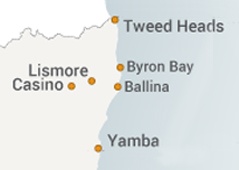Ariane, a counsellor from Lismore Sexual Health kindly agreed to answer a few questions about the Lismore Sexual Health service and the challenges for heterosexual people living with HIV in regional areas
What does your service do?
We provide a free and confidential service, including check-ups and treatments for sexually transmitted infections (STIs) and HIV testing. We do HIV management, and I personally do counselling, support and advocacy. We also do some Hepatitis A and B vaccinations for people who are eligible and we are a secondary NSP (needle and syringe exchange provider). We do both morning booked appointments and afternoon drop-in clinics. We also do health education in terms of linking in with GPs. We run an outreach clinic at Byron Bay and are linked in with Clinic 145 at Tweed Heads.
Do you see many heterosexual people living with HIV, if so what services do they come for?
We do see heterosexual people living with HIV, and they often come to see the specialist so they can be prescribed HIV treatments: They attend Lismore Sexual Health for HIV management and counselling as well.
What are the key issues for heterosexuals living with HIV in regional and rural NSW?
I think that there is a huge issue with regards to confidentiality and disclosure. For example the two people that I’m seeing at the moment don’t want anybody to know they’re living with HIV. So these people don’t want to have sexual relationships with anyone because they don’t want to have to disclose.* They don’t want to travel down to Sydney to access services, it’s too far for them, especially with petrol money. We also do peer-linkage here, but that doesn’t guarantee that the clients want to be linked. I don’t want to make gross generalisations, but it seems that it might be more difficult for the males that identify as heterosexual.
* A person with a sexually transmissible infection is no longer required by law to disclose that they have the condition prior to sexual intercourse – but are required to take reasonable precautions. See www.halc.org.au
What kind of services do you think this population needs that are currently not provided?
We need some kind of general campaign so that over time it becomes clear that you’re not a pariah if you’re a person living with HIV. In this area you feel a lot more vulnerable and visible, because it’s not like a larger city where you have more anonymity. I even have two couples living with HIV at the moment and neither of the couples wants anybody to know that they’re living with HIV; it’s very difficult and isolating. I think for the people living in our area that are gay and living with HIV there is more support, and they seem to be more likely to be upfront about it. There is also a history of gay people more readily using social media which has categories and options to identify as HIV positive so there are fewer stigmas, but I can’t imagine RSVP having that.
Lismore Sexual Health Service
4 Shepherd Lane, Lismore
(02) 6620 2980 (For appointments and inquiries)
